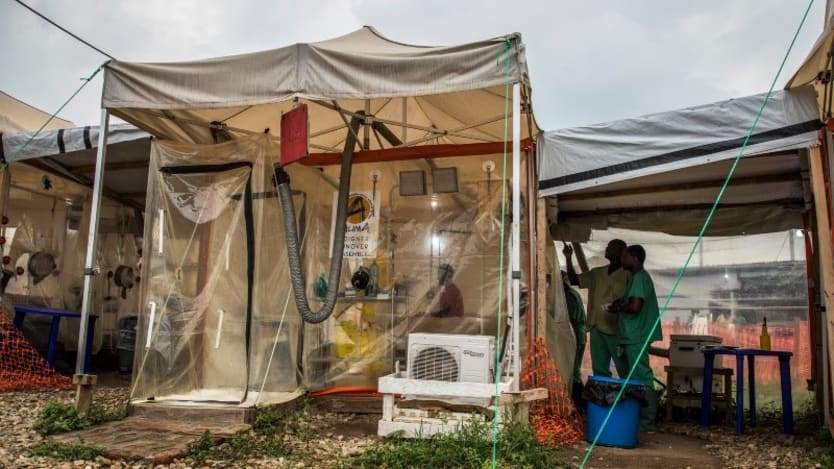
Just weeks before the coronavirus outbreak was declared a pandemic by the World Health Organization, I was in Goma, Congo, where a deadly Ebola epidemic was being brought under control. There is much we should learn from how African countries have fought epidemics. This is a time for humility.
At the Virunga Hospital — one of Goma’s largest, catering to half a million people and covering 19 administrative health areas — the chief doctor greeted us with an elbow bump. This gesture, which was to become commonplace in the U.K. just a few weeks later amid growing concern over the COVID-19 pandemic, had been the norm in all health facilities of the Kivu region provinces since August 2018, when the second-deadliest Ebola outbreak in history began.
COVID-19 — a timeline of the coronavirus outbreak
Follow the latest developments on the new coronavirus that causes COVID-19.
The epidemic claimed 2,266 lives out of 3,456 cases detected. This equates to a harrowing 66% case fatality rate, making Ebola easily one of the deadliest diseases known to mankind. The end of the epidemic was supposed to be declared this week, but new cases have been detected in recent days in the city of Beni, which will prolong the response. Nevertheless, in a region rife with violence — teeming with close to 100 armed groups, on last count — and with thousands of refugees and internally displaced people on the move at any given time, this is an extraordinary achievement. Save the Children, along with many other organizations, played a part in helping control this outbreak. But the people of Congo are the real heroes of this fight, and when the epidemic is finally declared over, they will own every bit of this victory.
The Virunga Hospital’s Ebola triage center, set up on the edge of its compound, provides an insight into how Congo fought the epidemic. That is where patients with Ebola-like symptoms would be taken in the first instance to determine the severity of their symptoms and to be tested for the virus. If Ebola was strongly suspected, the patient would then be taken by ambulance to the closest Ebola treatment center, located 7 kilometers away. Any patient discharged would be subject to a strict post-diagnosis follow-up protocol for 21 days, in case the symptoms worsened.
The triage center — kept spotless, with personal protective equipment well-stocked and protocols clearly signposted — is state of the art. Just four confirmed cases of Ebola were identified in Goma during the entire epidemic, all of them originating from one pastor who had traveled from the city of Butembo. That such a highly contagious disease was kept from spreading further in one of Congo’s largest and busiest cities is remarkable.
The development of an Ebola vaccine has also played a role in containing the epidemic, although its precise contribution isn’t clear. The two-dose vaccine, produced by the company Johnson & Johnson, was at first administered only to suspected Ebola patients and those at risk of being infected but was then extended to the entire health zone. Evidence suggests it is highly effective, although more research is needed.
How did they do it, and what must we learn from it?
To be clear, Congo’s Ebola epidemic and the COVID-19 pandemic are, in many respects, vastly different problems: different pathogens, disease transmission routes, symptoms, therapies, and fatality rates — and, of course, an entirely different scale.
But they also share many similarities: zoonotic roots, rapid transmission, the importance of hand-washing and social distancing, a lack of widely available vaccines or therapies. They are two distinct yet related manifestations of the threat to global health security. There is much we can learn from Congo’s Ebola experience, including:
Working across the “service chain.” Building on the experience of the 2013-14 Ebola epidemic in West Africa, the response worked on preventive measures that involved communities right from the start and on the treatment and referral of sick patients. This was by no means easy: At times, the response was actively resisted by communities that did not understand or accept that Ebola was receiving more attention than other pressing issues, such as attacks by armed groups, which were associated with many more deaths than the virus. But securing buy-in from the population was simply not optional in tackling Ebola. It isn’t optional for tackling COVID-19, either.
Testing and contact tracing. Probably the single most potent difference between the Asian and European responses to COVID-19 was the former’s use of systematic testing and contact tracing to track the virus and to stop transmission routes early on. This approach has made South Korea’s response much swifter than Italy’s, for instance. Tellingly, this was also a crucial strategy in containing and ultimately beating Ebola in eastern Congo, with systems of community-initiated alerts put in place to effectively link up villages to the health system in real time.
Equitable access to care, protection, and vaccines. The widely used phrase and hashtag #HealthForAll is always pertinent but never more so than in a situation like this one. Ebola and coronaviruses don’t discriminate, and neither should the response. In eastern Congo, making vaccines available to all who needed them, when they needed them, was an essential part of the strategy. The stories of COVID-19 tests being purchased at a high price by celebrities while many front-line health workers are still untested not only defies logic but fundamentally undermines public trust in the response.
Decentralization. Any health system has a finite number of staffers. To ensure that routine, lifesaving services such as vaccination and malaria treatment are protected during an epidemic — something Sierra Leone and Liberia notably failed to achieve in 2013 amid the Ebola outbreak — a response should be wary of displacing scarce resources away from the front line. In Europe, some evidence is suggesting decentralizing the response to accelerate the pace and scale of testing and contact tracing. The Ebola response in Congo became gradually more devolved as the epidemic spread, although this wasn’t without its challenges.
Visit our dedicated COVID-19 page for news, job opportunities, and funding insights.









